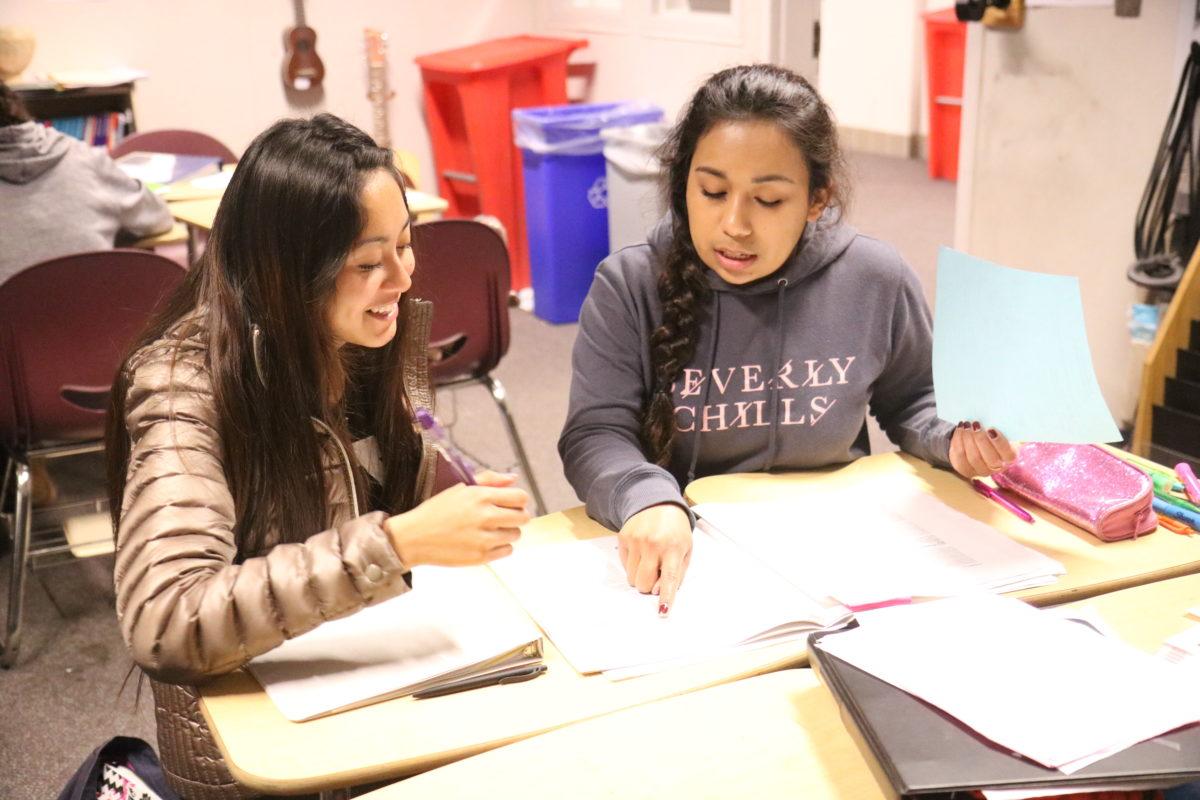[cbtabs][cbtab title=”Spanish”]
Compás ayuda a elevar los grados y da la bienvenida a los recién llegados
[dropcap size=small]S[/dropcap]egundo año Diane Rojo Gutiérrez, que originalmente tenía un comienzo rocoso de su año escolar debido a los evidentes obstáculos que enfrentan una barrera idiomática, acredita su mejora al apoyo que recibió del Compás.
“Ellos [mis calificaciones] han mejorado drásticamente. Matemáticas, aunque no fue mi mejor nota, siento que definitivamente he aprendido mucho,”dijo Rojo. “No, [no hay nada que deseo iba a cambiar de programa]. Me ha ayudado y dado su tiempo para ayudarme. Estoy agradecidamente, en general, que están aquí para apoyarme, y también para el Sr. Land, desde entonces ha sido la fuerza impulsora detrás de la mayor parte de esto.
Con toda la ayuda y la comunidad
que ofrece el programa, el consenso general es que está aquí para quedarse y va a seguir creciendo.
“Creo que hemos demostrado cómo el experimento [Compás] es acertado y vale la pena mantener. Así que no va a desaparecer. Este año, el año que viene. Tenemos que seguir construyendo sobre él.” Tierra, dijo.
Apenas un semestre después de su composición, el programa de ELL (English Language Learners) dirigido, Compás, ha hecho justo lo que se había propuesto para hacer: para ayudar a los estudiantes al enseñanza del inglés luchando con su trabajo de clase tienen éxito, según consejero de grado noveno Xelina Rojas.
se inició el
Oct. 27, apenas unas semanas en el año 2016-2017, y aunque una gran mejora de ningún programa en absoluto,Compás todavía tiene algunos obstáculos. Con 169 ELLs, 25 de los cuales son actualmente tutorizada por sus 13 compañeros bilingües, la necesidad de que el programa crecer se ha hecho conocidos.
Sin embargo, es la mejora de la actual ELL estudiantes en sus calificaciones del semestre que demuestra el efecto positivo del Compás en su trabajo académico y su moral general, según el profesor de gobierno y historia Geoff Land y Rojas. Esta inclusión y atención a estos estudiantes que son nuevos en la escuela y el país, ha abierto un ambiente acogedor que ha sido una parte integral del éxito del programa y el enfoque.
“Muchas veces estos alumnos sienten como que están nadando con los tiburones,” dijo Land. “Son una persona extranjera en una tierra extranjera, y nadie los entiende pero sus compañeros de recién llegados. Así que es agradable ampliar esa comunidad de paraguas a ellos, y creo que ha sido muy acertado también. He visto bajar el nivel de ansiedad, y he visto subir el nivel de confort. No es algo que se puede medir fácilmente, pero creo que es parte de la solución.”
Mientras que no hay planes oficiales se han hecho para este año, la versión del próximo año del Compás será más estable que el actual.
“Habrá cambios el año que viene, seguramente, porque tiene que ser un programa constante desde el principio.” dijo Rojas, “ojala nos podamos afinar y ser mucho más organizados en el comienzo del año [próximo] si reclutamos AVID tutores de 11 y 12 grado en la primavera y los tienen entrenados antes de que llegue el otoño.”
Land espera incluir más educadores de padres bilingües en el año siguiente, para trabajar con los profesores en las clases principales y más fuentes bilingües. Han tenido una reunión con los padres, pero con asistencia limitada. Compás expandirá su alcance para mejor incluirlos dentro de los avances de sus hijos.
Pero eso no quiere decir que el programa no funciona, o que el estudiante no está contento con él. Rojas es un testimonio de eso.
Grado 12 Lupita Uribe, uno de los estudiantes de MECHA originales, después de la audiencia de Rojas que un estudiante le había enviado un correo electrónico sobre cómo áspera era su primer día de escuela debido a la barrera del idioma, con el empuje para abordar la falta de apoyo para los estudiantes ELL.
“Siempre vienen con el trabajo, vienen con más preguntas, y no son tímidos, así que siento que somos amigos. Siento como soy realmente una mentor.”dijo Uribe, quien expresó que le gustaba el nuevo sentido de comunidad que el programa había crecido,”todos conocemos uno al otro, todos nos ayudamos.”
Tiempo y esfuerzo parecen ser en el corazón de lo que hace Compás un programa exitoso .
“Personalmente, yo diría que deberíamos darles más ayuda, más tiempo que simplemente tutorial.” dijo grado 12 Daniela López que es tutora de Rojo, que desea que Compás podría ser más que un solo período tutorial una vez por semana, y esperanzas que podría ampliarse en su propia clase independiente, “después de la escuela, sé que muchos de ellos no puede [entrar] debido a los buses, por lo que no puede permanecer para ayuda a pesar de que algunos de nosotros están disponibles. Así podría ayudar a, si se cambia la situación del autobús.”
[/cbtab][cbtab title=”English”]
Compás helps raise grades and welcomes newcomers
[dropcap size=small]S[/dropcap]ophomore Diane Rojo Gutiérrez, who originally had a rocky start of her school year because of the obvious obstacles faced by a language barrier, credits her improvement to the support she received from Compás.
“They [my grades] have improved drastically. Math, even though it wasn’t my best grade, I feel like I’ve definitely learned a lot more in,” said Rojo. “No, [there isn’t anything I wish would change about the program]. They’ve helped me, and given their time to help me. I’m thankfully, overall, that they’re here to support me, and also for Mr. Land, since he’s been the driving force behind most of this.”
With all the help and community that the program offers, the general consensus is that it’s here to stay, and will to continue to grow.
“I think we’ve proven that as experiment, [Compás] is successful and worth keeping. So it’s not going to go away. This year, next year. We need to keep on building upon it.” Land said.
Just one semester after its composition, the ELL (English Language Learners) aimed program, Compás, has done just what had set out to do: to assist English learning students struggling with their class work succeed, according to ninth grade counselor Xelina Rojas.
Compás was started on Oct. 27, just a few weeks into the 2016-2017 school year, and though a vast improvement from no program at all, Compás still has a few hurdles. With 169 ELLs, 25 of which are currently being tutored by 13 of their bilingual peers, the necessity for the program to grow has made itself known.
However, it is the improvement of current ELL student’s in their semester grades that demonstrates Compás’s positive effect on both their academic work, and their overall morale, according to both Government and History teacher Geoff Land and Rojas. This inclusion and attention towards these students who are new to both the school and the country has opened up a welcoming environment that has been an integral part of the program’s success and focuses.
“A lot of times these students feel like they’re swimming with the sharks,” said Land. “They’re a foreign person in a foreign land, and nobody understands them but their fellow newcomers. So it’s nice to expand that umbrella community to them, and I think that’s been very successful too. I’ve seen the level of anxiety go down, and I’ve seen the level of comfort go up. It’s not something that you can’t measure easily, but I think is part of the solution.”
While no official plans have been made for this year, next year’s version of Compás will be more stable than it currently stands.
“There’ll be changes next year, for sure, because it has to be a consistent program from the get-go.” said Rojas, “Hopefully we can fine tune it and it be much more organized in the beginning of [next] year if we recruit AVID tutors from 11th and 12th grade in the Spring and have them trained before Fall rolls around.”
Land hopes to include more bilingual parent educators in the following year, to work with teachers in core classes, and get them more bilingual sources. They have had one meeting with parents, but with limited attendance. Compas will expand its outreach to better include them within their children’s progress.
But that is not to say the program isn’t working, or that the students aren’t pleased with it. Rojas is a testament to that.
Senior Lupita Uribe, one of the original MECHA students who, after hearing from Rojas that a student had sent her an email about how rough their first day of school was because of the language barrier, was with the push to address the lack of support for ELL students.
“They always come with work, they come with more questions, and they’re not shy anymore, so I feel like we’re friends. I feel like I’m really a mentor.” said Uribe, who expressed that she liked the new sense of community that the program had grown, “We all know each other, we all help each other out.”
Time and effort seem to be at the heart of what makes Compás such a successful program.
“Personally, I would say that we should give them more help, more time than just tutorial.” said senior Daniela Lopez who is Rojo’s tutor, who wishes that Compás could be more than just a single tutorial period once a week, and hopes that it could be expanded into its own stand-alone class, “After school, I know a lot of them can’t [come in] because of the busses, so they can’t stay for help even though some of us are available. So that could help if the bus situation is changed.” [/cbtab][/cbtabs]













